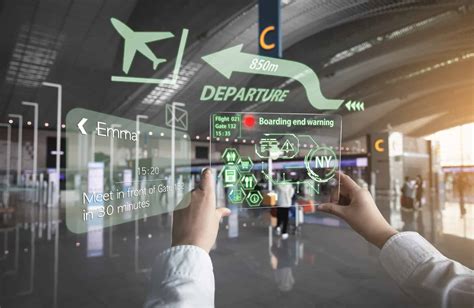Traveling has always been an exciting experience, allowing us to explore new places, immerse ourselves in different cultures, and create lifelong memories. However, traditional travel methods often involve tedious planning, endless paperwork, and unpredictable itineraries. But what if we told you that there's a game-changing technology that's revolutionizing the way we travel? Enter: Geospatial Intelligence (GI) technology.
In recent years, GI technology has been making waves in the travel industry, transforming the way we navigate, explore, and experience new destinations. From personalized travel recommendations to real-time itinerary management, GI technology is redefining the travel landscape. In this article, we'll delve into the world of GI technology and explore its exciting applications in travel.
What is Geospatial Intelligence (GI) Technology?

Geospatial Intelligence (GI) technology refers to the collection, analysis, and interpretation of geographically referenced data to extract meaningful insights. This technology combines satellite imagery, GPS data, and other spatial information to create detailed maps, models, and simulations. GI technology has numerous applications across various industries, including defense, agriculture, urban planning, and, of course, travel.
How is GI Technology Transforming Travel?

The integration of GI technology in travel has been a game-changer. Here are some exciting ways GI technology is revolutionizing the travel industry:
- Personalized Travel Recommendations: GI technology can analyze a traveler's preferences, interests, and behavior to provide personalized travel recommendations. By leveraging data from social media, travel history, and other sources, GI technology can suggest customized itineraries, activities, and accommodations that cater to individual tastes.
- Real-time Itinerary Management: GI technology can help travelers manage their itineraries in real-time. By leveraging GPS data, traffic patterns, and weather forecasts, GI technology can optimize travel routes, provide real-time updates, and suggest alternative plans in case of unexpected disruptions.
- Enhanced Navigation: GI technology can provide travelers with precise navigation, eliminating the need for physical maps and confusing directions. By leveraging satellite imagery and GPS data, GI technology can offer turn-by-turn directions, highlight points of interest, and provide real-time traffic updates.
- Safety and Security: GI technology can enhance safety and security for travelers. By analyzing crime patterns, weather forecasts, and other environmental factors, GI technology can provide travelers with real-time safety alerts and suggest safe zones to avoid.
GI Technology in Action: Real-World Applications

Several companies and organizations are already leveraging GI technology to revolutionize travel. Here are some exciting real-world applications:
- Google Maps: Google Maps is a prime example of GI technology in action. By leveraging satellite imagery, GPS data, and other spatial information, Google Maps provides users with precise navigation, real-time traffic updates, and personalized travel recommendations.
- TripAdvisor: TripAdvisor is another example of GI technology in travel. By analyzing user reviews, ratings, and behavior, TripAdvisor provides travelers with personalized travel recommendations, real-time itinerary management, and safety alerts.
- Airbnb: Airbnb is also leveraging GI technology to enhance the travel experience. By analyzing user preferences, behavior, and spatial data, Airbnb provides travelers with personalized accommodation recommendations, real-time itinerary management, and safety alerts.
Benefits of GI Technology in Travel

The benefits of GI technology in travel are numerous. Here are some of the most significant advantages:
- Improved Navigation: GI technology provides travelers with precise navigation, eliminating the need for physical maps and confusing directions.
- Personalized Travel Experience: GI technology provides travelers with personalized travel recommendations, real-time itinerary management, and safety alerts, enhancing the overall travel experience.
- Increased Efficiency: GI technology optimizes travel routes, provides real-time traffic updates, and suggests alternative plans in case of unexpected disruptions, reducing travel time and increasing efficiency.
- Enhanced Safety: GI technology enhances safety and security for travelers by providing real-time safety alerts, suggesting safe zones to avoid, and analyzing crime patterns.
Challenges and Limitations of GI Technology in Travel

While GI technology has the potential to revolutionize travel, there are several challenges and limitations to consider:
- Data Quality: The accuracy and quality of spatial data are crucial for GI technology to work effectively. Poor data quality can lead to inaccurate results, compromising the travel experience.
- Privacy Concerns: GI technology raises significant privacy concerns, as it often relies on personal data, location tracking, and other sensitive information.
- Infrastructure: GI technology requires significant investment in infrastructure, including satellite imagery, GPS data, and other spatial information.
- Cybersecurity: GI technology is vulnerable to cyber threats, which can compromise the security and integrity of spatial data.
Conclusion: The Future of Travel with GI Technology

The future of travel with GI technology is exciting and promising. As GI technology continues to evolve, we can expect to see even more innovative applications in travel. From personalized travel recommendations to real-time itinerary management, GI technology is revolutionizing the way we travel.
As we look to the future, it's essential to address the challenges and limitations of GI technology in travel. By investing in infrastructure, ensuring data quality, and prioritizing privacy and cybersecurity, we can unlock the full potential of GI technology in travel.
The possibilities are endless, and the future of travel with GI technology is bright. So, buckle up and get ready to experience the thrill of travel like never before!





What is Geospatial Intelligence (GI) technology?
+Geospatial Intelligence (GI) technology refers to the collection, analysis, and interpretation of geographically referenced data to extract meaningful insights.
How is GI technology transforming travel?
+GI technology is transforming travel by providing personalized travel recommendations, real-time itinerary management, enhanced navigation, and safety alerts.
What are the benefits of GI technology in travel?
+The benefits of GI technology in travel include improved navigation, personalized travel experience, increased efficiency, and enhanced safety.
